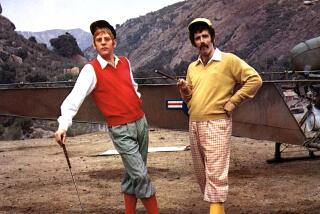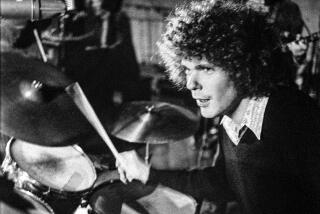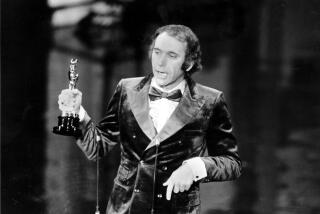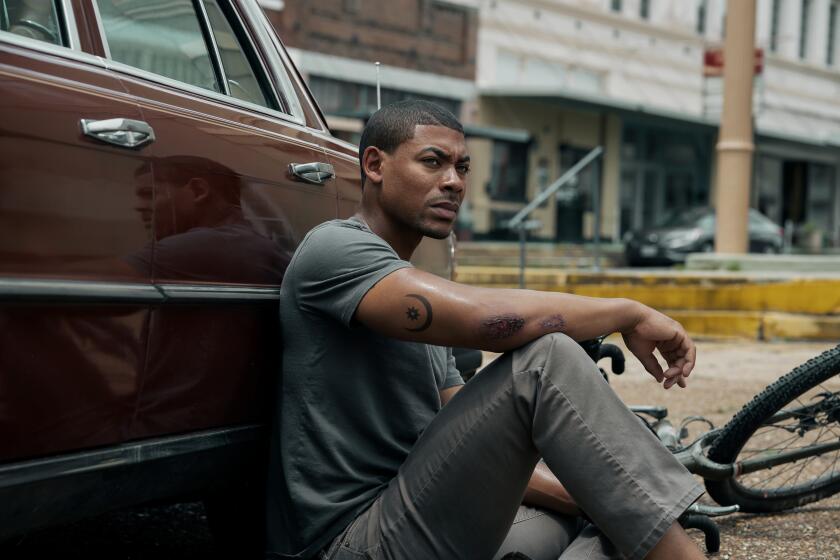A SAX MAN RETURNS : ‘Round Midnight’ Puts Dexter Gordon Back in the Spotlight
Before his Oscar-nominated role in “ ‘Round Midnight,” Dexter Gordon had not played his tenor saxophone in public in four years. Now, as a result of his new prominence, he’s in demand around the world.
The spectacular upsurge in Gordon’s fortunes has enabled him to set up a tour that will begin May 15, when he is set to head his own “ ‘Round Midnight” band with four men who were in the film with him: Cedar Walton at the piano, Bobby Hutcherson on vibes, drummer Billy Higgins, and French bassist Pierre Michelot. Together, they will play at a dozen European jazz festivals.
Conditions were very different during his previous tour, which led to Gordon’s decision to give up life on the road and head south to Cuernavaca, Mexico, where he and his wife live in their own home about five months a year.
“We were working continuously,” he said, “traveling night after night, often to places that had no real jazz orientation, and I just couldn’t handle it. By the time we got home I was completely wiped out.”
Working problems aside, his life style then was also in sharp contrast to Gordon’s recent circumstances. Time was when, visiting Los Angeles for a gig at a small club, he would be holed up in a less-than-luxurious hotel in Hermosa Beach. Recently, in town briefly to attend the Academy Awards ceremony, he was set up by Warner Bros. in the Andres Segovia Suite of the Beverly Wilshire. If he wanted to go to the Lakers game, he was assured of VIP seats. For the first time he found himself on the fashion pages, discussing the clothes he planned to wear to the Oscars show. (“It’s the outfit I wore at the New York Film Festival last fall--a sort of unusual tuxedo with a gambler’s necktie,” he told the press.)
It was inevitable that Gordon would be a towering presence at the Academy Awards. At 6 foot 5 inches, he has always been a prepossessing, soft-spoken figure with a ready smile. During an interview he spoke even more softly than Dale Turner, the character he played in “ ‘Round Midnight,” with even longer pauses.
Gordon was in poor health and in retirement when Bertrand Tavernier approached him to do the movie. He denies, however, a statement by Herbie Hancock, the Oscar-winning musical director of the film (he also played the Paris nightclub pianist), that Gordon had “just gotten out of the hospital” and is “the kind of guy that never practices.”
“Seems like Herbie has some kind of an attitude,” Gordon said. “The fact is, I was never in a hospital, and I practice every day--always have.
“I didn’t really know Herbie all that well. I had only made one session with him, when he recorded ‘Watermelon Man,’ back in 1962. Anyhow, when we started shooting in Paris, the first tune we had to play was ‘As Time Goes By.’ Herbie wanted to make a slick arrangement on it, but I said, ‘Hey, this is supposed to be an informal jam session. Let’s keep it simple.’ So we did it my way.”
Gordon’s way, in the course of a career that stretches back to 1940, has been strewn with the obstacles that were endemic to much of the jazz community when he was growing up in his native Los Angeles. Being black was not the only problem--the temptation of narcotics came into his life early.
Ironically, his first acting assignment came about as a result of his difficulties. In the mid-1950s, he served a two-year sentence for narcotics violations in Chino, and while there took part in a low-budget prison movie called “Unchained,” playing a musician. “I was seen but not heard,” he recalls, “because at that time I wasn’t even in the Musicians’ Union, so my part on the sound track was played in Hollywood by Georgie Auld.”
In 1960, Gordon appeared in the Los Angeles production of “The Connection,” Jack Gelber’s play about addicts. Then, because New York laws in those days prevented musicians with police records from acquiring a cabaret work card, he set out for Paris and settled, in 1962, in Copenhagen. Though there were several long return visits to the States, Denmark remained his home base for the next 18 years.
He was featured in a Danish version of “The Connection” on stage, and in a Danish movie. There were also what he says were cameo roles--bit parts in a couple of Swedish films. So he did not come to “ ‘Round Midnight” totally unprepared.
“It was a great surprise, though,” he said. “Suddenly, one day Tavernier came to my apartment in New York. He said he was a jazz fan. He’d seen me working in a Paris club when I was a young man, and he had this idea for a movie about jazz.
“He had no script, and I had trouble believing that he was serious, or that he could pull it off. But I somehow believed in him--I’m an optimist. That’s the only thing that’s kept me alive.
“My health wasn’t good; my life style had caught up with me, and I had physical troubles--pancreas, liver, you know . . . I really wasn’t functioning at all well. In fact, it’s amazing that I’m alive.” (At home in Mexico, Gordon stays on a regimen of herbs and hibiscus tea, with plenty of rest and regular massages.)
He objects to the claim by some critics that his nomination was unjustified because he was simply playing himself and “mumbled his way through the part.”
“I was not playing myself; I was playing Bud Powell, with touches of Prez (Lester Young) and Ben Webster,” Gordon said. (Powell was the deeply disturbed pianist who, like Dale Turner, went to Paris and lived there for some years, but died after trying a comeback in New York. Young, whose eccentric speech habits Gordon used in the film, died immediately after returning home from Paris; Webster, also a tenor sax giant, died in Amsterdam after years of expatriation.)
“Doing the film was great for my spirits. I got better as I went along; and believe me, I didn’t find acting easy at all. I had to take direction, and we went over the script every day. If anything in the writing sounded wrong to the musicians, Tavernier let us change it. So it was a unique experience, and I was happy to be among all those smiling faces--Billy Higgins, Bobby Hutcherson, Pierre Michelot, and, in the New York scene, Freddie Hubbard and Cedar Walton, with Dale Turner coming back after his European successes, then getting back into his old haunts and habits.”
“Don’t you think,” he was asked, “that if Bud Powell had never come back, he might have lived longer?”
“Yeah . . . he was protected in Paris. . . . I knew Bud since we were both kids coming up in New York--I was with Lionel Hampton’s orchestra and Bud was with Cootie Williams. Bud was into drugs for a while, but I never considered him a real user. He was just emotionally disturbed, and when his brother, Richie, who was a fine pianist, too, was killed in a car crash, that threw him even further out.”
An invaluable fringe benefit of Gordon’s film success has been his first leap to the top of the best-seller lists. His Blue Note LP, “The Other Side of ‘Round Midnight,” a mixture of sound-track material and Paris studio recordings, is in its fifth week at No. 1 on the jazz chart in Billboard. Meanwhile, Herbie Hancock’s album on Columbia, in which Gordon also takes part, has been holding at No. 4.
“The reason there are two different records,” Gordon explained, “is that Herbie was under contract to CBS, so they got to put out the official sound-track album. My contract is with Blue Note Records.”
Meantime, Gordon’s movie career appears to be taking off, too. He has already received another script to look over.
More to Read
Only good movies
Get the Indie Focus newsletter, Mark Olsen's weekly guide to the world of cinema.
You may occasionally receive promotional content from the Los Angeles Times.










